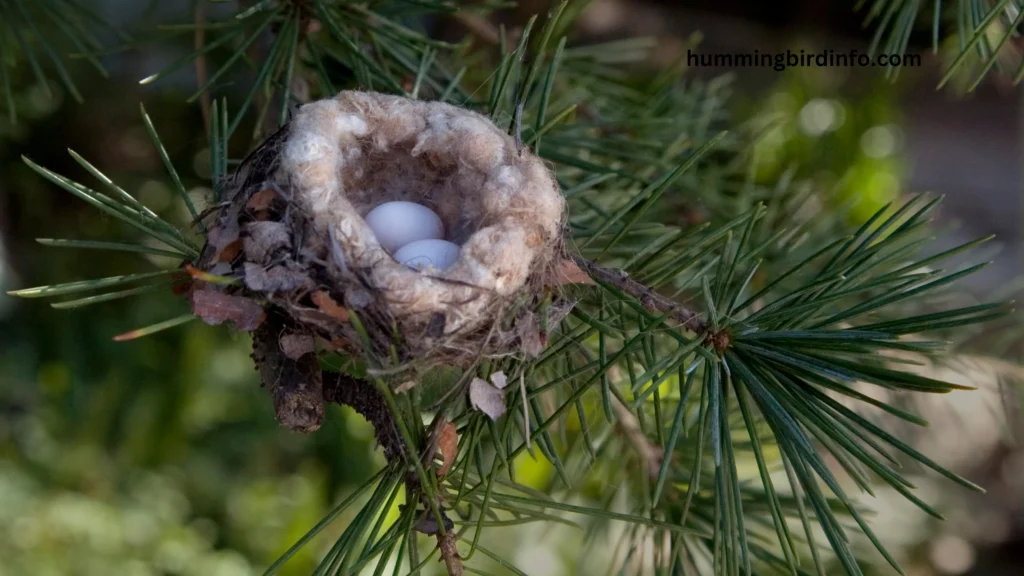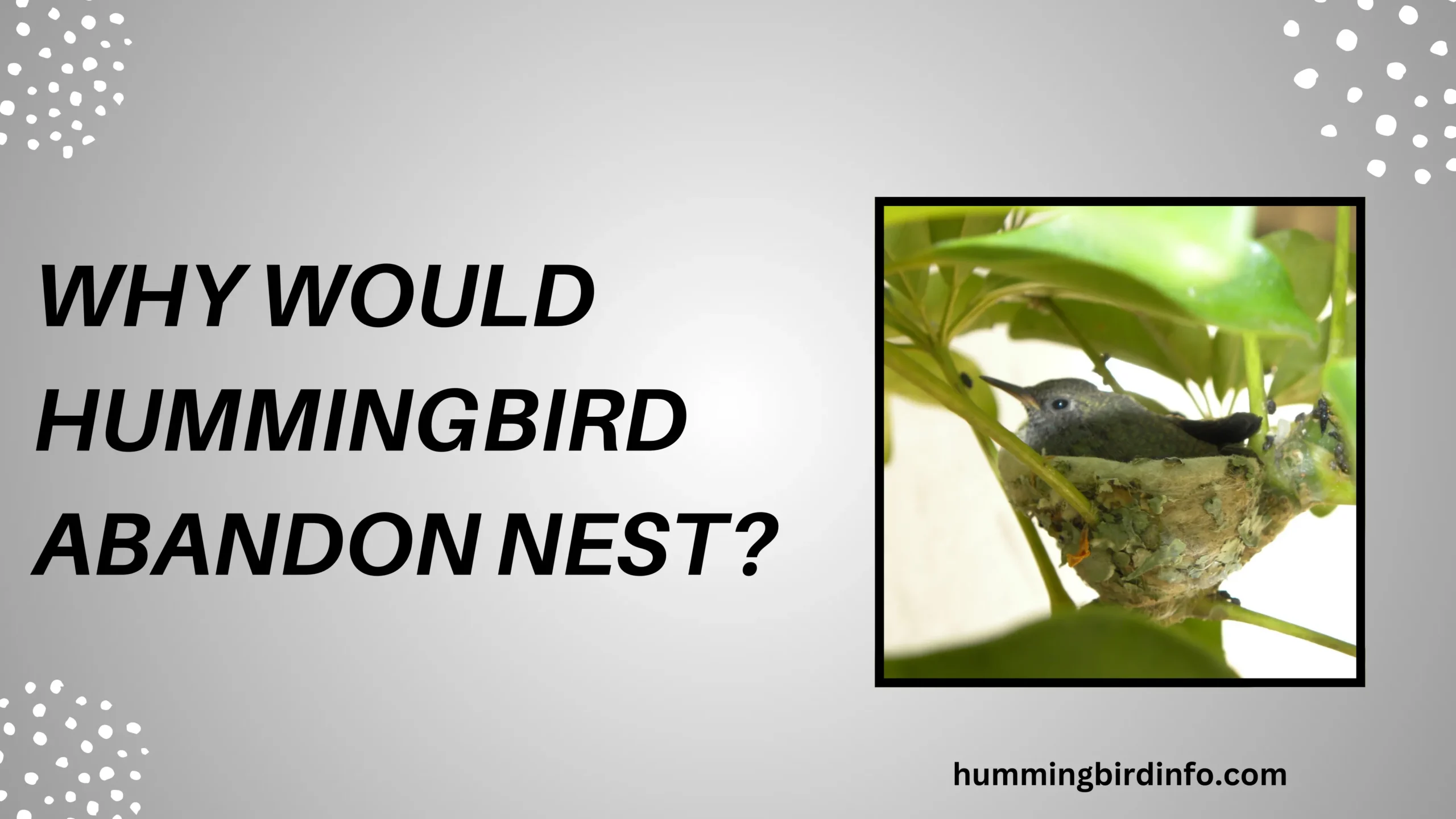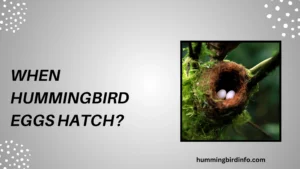A tiny nest, no bigger than a thimble, rests hidden among the leaves. It’s a masterpiece woven from spider silk, lichen, and hope — yet sometimes, heartbreakingly, it’s left empty and silent. Why would a mother hummingbird, so dedicated and tireless, suddenly abandon her nest?
Understanding hummingbird nesting behavior is key to appreciating just how much energy, patience, and risk the female invests. From selecting the perfect location to tirelessly feeding her tiny chicks, she faces enormous challenges that most of us rarely see. Every choice she makes determines the survival of her offspring.
When a hummingbird abandons her nest, it’s not a careless decision — it’s often one made under intense pressure.
Exploring the reasons behind nest abandonment helps us better protect these incredible birds and create safe spaces where they can thrive. Let’s uncover the hidden struggles hummingbirds face and learn how we can help.
Contents
- 1 Environmental Stressors and Resource Availability
- 2 Predation and Perceived Threats
- 3 Physiological Limitations and Maternal Condition
- 4 Nest-Specific Issues
- 5 Conclusion
- 6 FAQs
- 6.0.1 1. Why would a hummingbird leave her eggs?
- 6.0.2 2. Can loud noises cause a hummingbird to abandon a nest?
- 6.0.3 3. Does touching a hummingbird nest cause abandonment?
- 6.0.4 4. Will a hummingbird return to a disturbed nest?
- 6.0.5 5. How do predators affect hummingbird nests?
- 6.0.6 6. What happens to abandoned eggs or chicks?
- 6.0.7
Environmental Stressors and Resource Availability
Food scarcity can be devastating for a hummingbird mother, whose energy needs soar while building nests and feeding chicks. If nectar-rich flowers dwindle due to drought, pesticides, or habitat loss, she may be forced to abandon her brood to survive.
Water shortages can worsen the situation, especially during heatwaves, by reducing both nectar flow and hydration opportunities. Dehydrated, stressed, and struggling, a mother may have no choice but to prioritize her own life over her nest.

Extreme weather, like heavy rains, freezing temperatures, or strong winds, can physically destroy nests or chill fragile eggs and chicks. If the nest is damaged beyond repair, abandonment becomes the only option for a desperate mother.
Habitat degradation through urbanization and agriculture strips away essential nesting sites and feeding grounds. When familiar territories turn into concrete deserts, hummingbirds are left vulnerable and scattered.
Climate change compounds all these threats, leading to erratic bloom times, insect scarcity, and unstable nesting seasons — overwhelming even the most resilient hummingbird mothers.
Predation and Perceived Threats
Predators pose constant dangers: snakes, jays, squirrels, domestic cats, and even praying mantises all prey on hummingbird nests. If a female senses frequent predator presence, she might flee rather than risk a brutal loss.
Human disturbance can be just as dangerous as predators. Getting too close to a nest for photos or prolonged observation can stress the female and unintentionally lead predators straight to her vulnerable chicks.
Touching a nest, eggs, or chicks can leave human scent behind, attracting predators or causing the mother to reject the site altogether. Good intentions sometimes lead to heartbreaking outcomes.
Noise and construction activity near nests can be overwhelming. Loud machinery, persistent human presence, and even heavy landscaping can create so much stress that the female feels forced to abandon her young.
Territorial battles with other birds or mammals can increase anxiety levels around a nest. Aggressive hummingbirds or rival species competing for food may make the nesting area too dangerous to stay.
Physiological Limitations and Maternal Condition
Mother hummingbirds push their tiny bodies to the brink while nesting. If their energy reserves drop too low due to illness, parasites, or injury, survival instincts might drive them to abandon the nest.
Young, inexperienced females may be more prone to abandoning nests when faced with unexpected challenges. Their lack of experience in choosing locations or handling disturbances puts their first nests at higher risk.
Older, seasoned females are better at recognizing when a situation is hopeless — sometimes abandoning early to attempt a second, more successful nest elsewhere.
Stress hormones build up when constant threats or environmental hardships persist. Overwhelming stress can biologically trigger abandonment behavior as a last-ditch survival mechanism.
Parasites and disease within the female or chicks can also influence her decision. If disease weakens her ability to forage and care for her chicks, she may choose to conserve her strength for another breeding attempt.
Nest-Specific Issues
Egg infertility can be heartbreaking; if eggs don’t develop after a certain period, the female instinctively knows to move on. Investing energy in a doomed nest isn’t an option when survival is on the line.
Nest damage from storms, predators, or poor construction can render a home unfit for raising chicks. If a nest becomes unstable, exposed, or irreparable, abandonment is often unavoidable.
Chicks that fail to thrive — due to deformities, genetic issues, or disease — may lead a mother to abandon them to focus on future broods. It’s a cold reality of survival in the wild.
Parasitic infestations of mites or fly larvae can attack eggs or chicks, compromising the health of the entire nest. Some females will abandon a heavily infested nest rather than continue a futile fight.
Nest location errors also play a part. If the site becomes exposed to predators or weather after construction, or if human changes to the environment occur nearby, abandonment becomes the safest option.

Conclusion
Hummingbird nest abandonment is not a simple failure — it’s often a hard decision driven by the reality of survival. These tiny birds face enormous challenges every day, and sometimes, leaving a nest behind is the best choice.
From food scarcity to predator threats, human disturbance, and health struggles, the reasons are complex and heartbreaking. Understanding these reasons helps us appreciate their resilience and highlights the importance of protecting their habitats.
By respecting their space, avoiding interference, and supporting healthy environments, we can give hummingbirds a better chance to raise their next generation. Their survival depends not just on their strength but also on our compassionate care.
FAQs
1. Why would a hummingbird leave her eggs?
A hummingbird may leave her eggs if she senses severe threats, faces food shortages, or realizes the eggs are infertile or damaged.
2. Can loud noises cause a hummingbird to abandon a nest?
Yes, loud noises like construction, music, or heavy foot traffic near the nest can stress the female and drive her to abandon it.
3. Does touching a hummingbird nest cause abandonment?
Touching a nest can leave human scent, making it vulnerable to predators and causing the mother to feel it is unsafe, leading to abandonment.
4. Will a hummingbird return to a disturbed nest?
If the disturbance was brief and minor, she might return, but significant disruption often causes permanent abandonment.
5. How do predators affect hummingbird nests?
The presence of predators like snakes, cats, or birds near a nest increases the risk to the chicks, often forcing the mother to abandon.
6. What happens to abandoned eggs or chicks?
Unfortunately, abandoned eggs or chicks usually don’t survive, unless another animal (rarely) adopts them or conditions somehow remain favorable.








